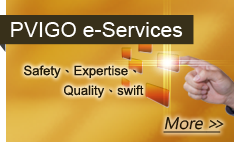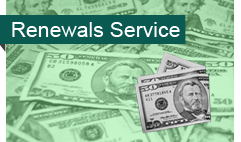
Photo credit / Jon Rawlinson
When was the last time that your company made a renewal payment? How much does your company spend on maintaining its patents every year? And more importantly, how much of this money went into the pockets of your patent agency? This figure may be well beyond what you might imagine.
Although it normally takes 4-5 years from application to grant, being granted a patent is by no means the end of the patent process; on the contrary, you should see it rather as a starting-out point. Just one slip-up, such as forgetting to pay a fee at the allotted time, could result in you losing your patent.
Companies usually assign responsibility for renewal payments to their in-house legal or IP departments; however, they may not be able to dedicate a specific staff member or team to each country in which the company holds patents, if the company’s scale and costs make this unviable. For this reason, a common choice for most firms is to outsource renewals to a dedicated renewals agency, which gives these agencies relatively free-reign when it comes to pricing.
In economic theory, adverse selection occurs when there is an asymmetry of information between a buyer and a seller. If buyers can’t distinguish between high-quality and low quality products, they will only be willing to pay an average of the price of a high quality item and a low quality item; the seller, knowing which items are high quality and which are low quality will use this knowledge to sell the low quality items at an inflated price and then move out of the market without selling the high-quality items. This leads to high-quality goods being eliminated from the market. If we apply this concept to the patent renewals industry, we can see that large international renewals agencies first offer low service fees to entice unsuspecting clients, and then take advantage of the client’s lack of knowledge about renewal payments to make unreasonable profits by quoting inaccurate renewal fees. There has already been substantial discussion of this issue in the international IP community after an article entitled ‘Hidden Fees: Foreign Exchange and the Dark Side of Patent Renewals’ was published on the website of UK renewals agency RenewalsDesk, which exposed the underhand practices of many international renewals agencies.
Table 1: How disreputable agencies use the exchange rate to defraud their clients
- The prices quoted below relate to patent renewal fees payable on the 15th year of a patent with 17 claims registered with the Japan Patent Office (JPO). The official fee quoted by the JPO is ¥143,000.
- Taipei-based Mega International Commercial Bank quoted a spot exchange rate of NT$0.27 against the yen for Nov. 13, 2014.
Quoted Price |
Renewals Agency A |
|
Discrepancy
(Agency A Price – PVIGO Price) |
Service Fee Quote (NTD) |
1,500 |
3,000 |
-1,500 |
Renewal Fee Quote (NTD) |
42,074 |
38,249 |
3,825 |
Total (NTD)
(Service Fee + Official Fee) |
43,574 |
41,249 |
2,325 |
※ You can see from the table that Renewals Agency A adopted a spot rate of NT$0.29 against the yen, while NAIP PVIGO e-Services used the rate of NT$0.27 quoted by the bank. Although Renewals Agency A offers a lower service fee, the total cost to the client is still NT$2,325 more than that quoted by NAIP’s PVIGO e-Services platform (See Figure 2).
Figure 1: Spot rate for Taiwanese dollar against the yen in 2014
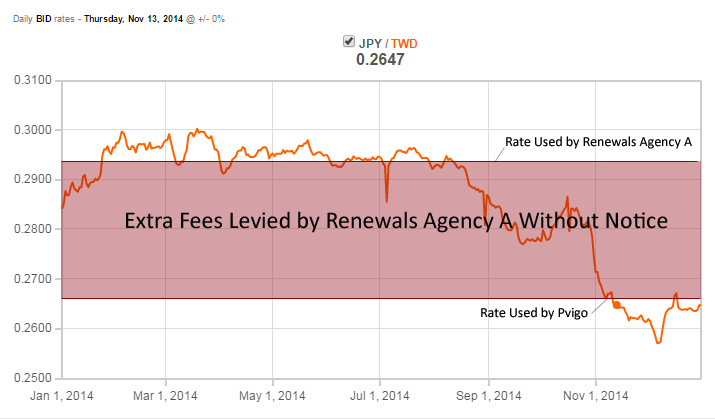
Historical Exchange Rate Data: Oanda Currency Converter
Figure 2: Total Fees Collected - Renewals Agency A vs PVIGO e-Services
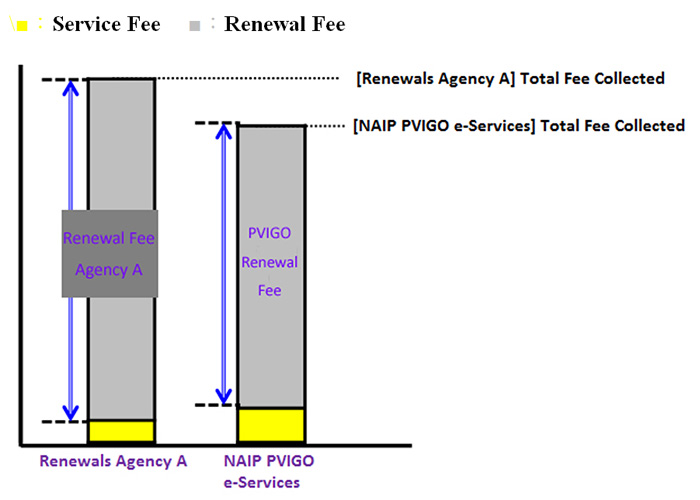
As the NAIP PVIGO e-Services team explains, renewal fees are set by the intellectual property offices of each country and are non-negotiable. If you are paying hand over fist for a renewal fee quoted to you by an agency without looking further into the costing, you are likely paying a hidden additional service fee. “If you look into it you will discover that many of the exchange rate quotes provided by renewals agencies are priced extremely conservatively in their own favor, resulting in a wide discrepancy between the price they quote and the market price. Some agencies will not even provide you with an exchange rate” said one PVIGO e-Services team member. The PVIGO team estimates that the discrepancy can range from 10%-20%, leading to substantial unseen additional costs for the patent holder.
Another thing you should be wary of is the range of optional services promoted by renewal agencies. One of the most important aspects of providing renewals services is offering reminders to the patent holder of when payments are due and the amount they need to pay, but patent holders may also have other demands that go beyond this scope. A member of the PVIGO team explains, “If a company wants to adjust the timing of reminders or if they have questions about extending the payment deadline in a specific country, the agency may ask them to fork out an additional fee.” A PVIGO service team representative said that the low quote for service fees at the beginning is really just an entrance fee, if you need additional services you’ll have to purchase them separately, which might not work out to be good value.
So how should business owners handle their patent renewals? Thinking about it rationally, if the number of patents in your portfolio and the number of countries to which you’re applying continues to grow, outsourcing is inevitable; however, you shouldn’t rest on your laurels after having handed over the management to a renewals agency. The PVIGO service team suggests that when choosing a renewals agency you should keep the total cost in mind, in that, as well as the quoted service fees, you need to inquire as to whether there are hidden costs, like, for example, those incorporated into the exchange of foreign currency when making payments for renewals overseas or additional services fees. You should be careful to ask for itemized costings; otherwise you may end up being led down the garden path by the agency.
PVIGO Insight
What makes a quality patent renewals agency? The PVIGO team thinks that transparency is the most important factor in deciding this.
In contrast to many renewals agencies, which only provide a simplified price list to their clients, PVIGO has opted to allow our clients to check the details of fees and charges online at the touch of a button, making the renewal payment process completely open and transparent. With renewal fees, the PVIGO team allows clients to see the fees in the designated currency of the country in question, as well as clearly demarcating the service fees and the renewal fees, the latter calculated with reference to the exchange rate (using the Mega International Commercial Bank daily spot rate), which means that clients don’t have to fork out additional money. (See Figure below).
PVIGO Renewal Fees
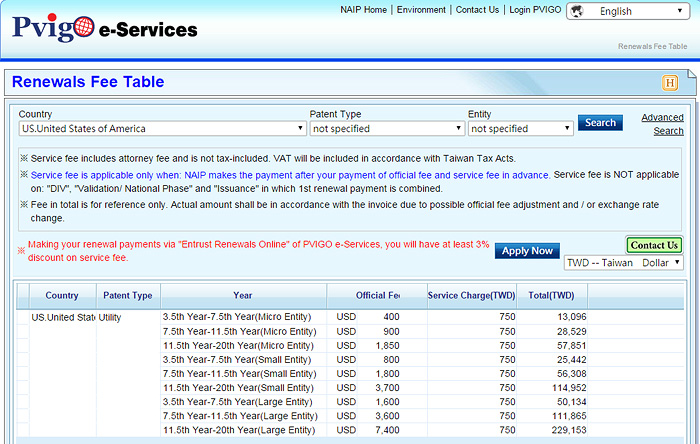
(Courtesy of https://www.pvigo.com/Custmem/eTrans/AnnualFee/AnnualFeeSrh.aspx?strEnc=en-US)
It is not just renewal fees that are transparent on the PVIGO platform. With the help of NAIP’s legal research and information systems departments, the application number, the publication date, the grant date and the renewal deadlines of each patent in each country are all easily accessible on the PVIGO platform. If there is any change in legislation that may affect our clients’ interests, the PVIGO team will inform you at the earliest possible opportunity. In the case of the introduction of the America Invents Act in 2011, which granted the United States Patent and Trademark Office (USPTO) the authority to adjust renewal fees, for example, PVIGO provided timely notice and analysis for clients, as well as coming up with new payment plans to help clients continue to save money. In other words, PVIGO is not just a patent renewals agency; it is also a comprehensive and state-of-the-art patent management platform.
The PVIGO team believes that true professionalism is rooted in sincerity, which in turn comes from both parties having access to the same amount of information. Although we are always working to improve the quality of our services, transparency is a value that the PVIGO team will never abandon.
Learn more about NAIP’s Patent Renewal Services
Learn more about the services offered on NAIP’s PVIGO service platform
You can also contact us directly at service@pvigo.com or call on +886-2-8923-7350 #1888 and we’ll get back to you promptly.
 |
|
| Author: |
Clarence Chiang |
| Current Post: |
Senior Editor, NAIP Newsletter |
| Education: |
Business Administration, National Chengchi University, Taiwan |
| Experience: |
Reporter, CommonWealth Magazine
Reporter, Business Today Magazine |
|
|
 |
|
| Author: |
Conor Stuart |
| Current Post: |
Senior Editor, IP Observer |
| Education: |
MA Taiwanese Literature, National Taiwan University
BA Chinese and Spanish, Leeds University, UK |
| Experience: |
Translator/Editor, Want China Times
Editor, Erenlai Magazine |
|
|
|
| Facebook |
|
Follow the IP Observer on our FB Page |
|
|
|
|
|
|


